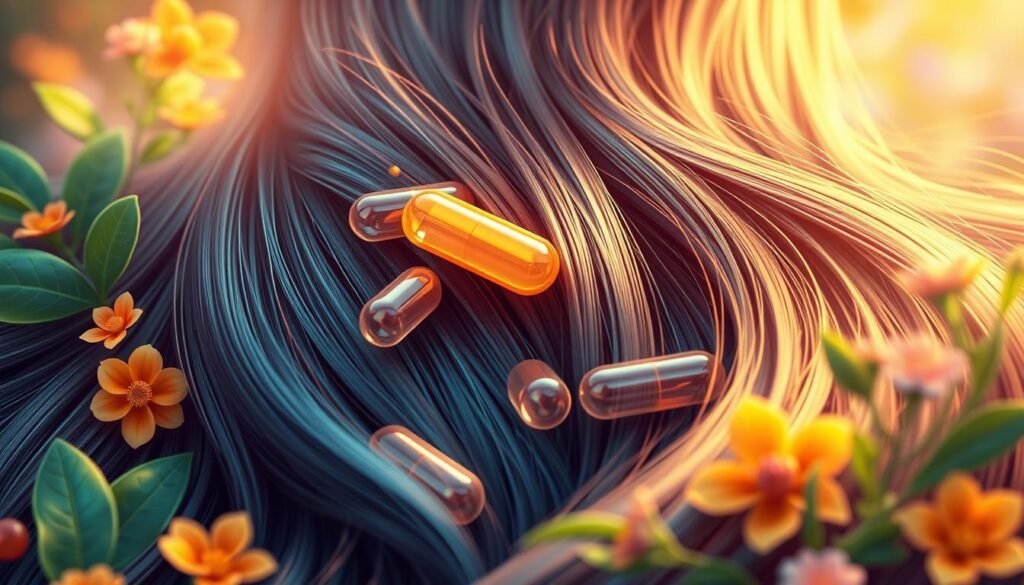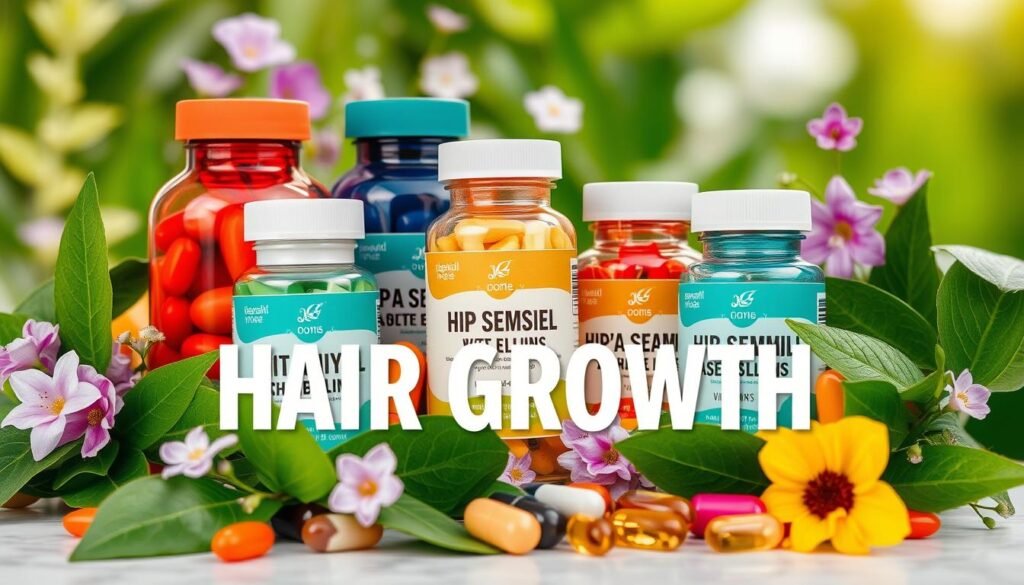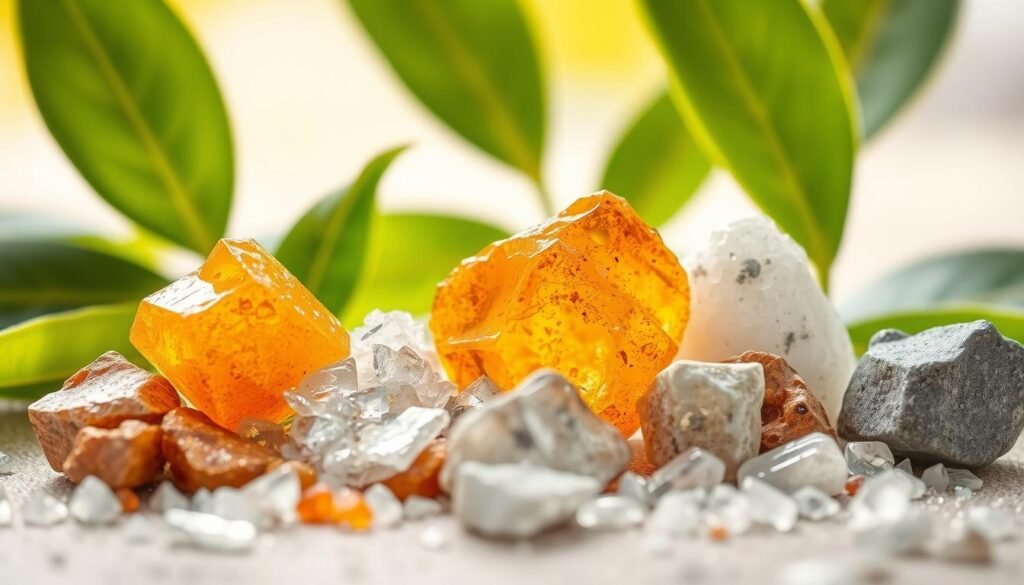About 50 million men and 30 million women in the United States face hair loss. It’s a huge issue that needs solutions. Luckily, science has found vitamins and nutrients to improve hair health and growth. We’ll look at the best supplements for hair loss. These include important hair growth nutrients like Biotin, Vitamin C, and Zinc. They help fight against hair thinning.
People are looking for ways to beat hair loss. It’s crucial to know how certain nutrients help. They provide vitamins to the follicles and boost overall health. The right supplements can make a big difference in getting your hair back. For tips on what to use, read more about vitamins and supplements for healthier hair.
Key Takeaways
- Hair loss affects millions, highlighting the importance of effective solutions.
- Key nutrients such as Biotin and Zinc play a crucial role in hair growth.
- Supplements can significantly impact hair health when taken properly.
- Genetic and environmental factors also influence hair loss.
- A comprehensive approach combining various nutrients is often most effective.
Understanding Hair Loss and Its Causes
Hair loss is complex and has many causes. By knowing these causes, people can find the right solutions for themselves.
Genetic Factors
Genetics is a big reason for hair loss. Androgenetic alopecia, or pattern baldness, is common in families. If your family has it, you might get it too.
Hormonal Changes
Hormones also affect hair health. Changes during pregnancy, menopause, or with thyroid problems can cause hair to thin. These changes upset the natural growth of hair.
Environmental Influences
The environment impacts hair health too. Pollution, stress, and chemicals can harm hair and scalp. Fighting these can help keep hair healthy and limit loss.
Top Supplements for Hair Loss
Finding the right supplements for hair loss is essential. It helps in growing healthy hair. Knowing about these supplements can make choosing what to eat easier.
Overview of Effective Nutrients
Lack of certain nutrients can weaken hair, leading to loss. Key supplements for hair include:
- Biotin: This helps make hair stronger by supporting keratin production.
- Vitamin D: It improves the health of hair follicles to support growth.
- Iron: Important for bringing oxygen to hair roots.
- Zinc: Crucial for growing and fixing hair.
How Supplements Can Help
Using certain supplements can help in getting thick hair. They work by:
- Providing vitamins and minerals that make hair strong.
- Boosting blood flow to the scalp, which helps hair roots get more nutrients.
- Helping balance hormones that might cause hair loss.
| Nutrient | Function | Sources |
|---|---|---|
| Biotin | Supports keratin production | Eggs, nuts, whole grains |
| Vitamin D | Maintains hair follicle health | Fatty fish, fortified foods |
| Iron | Promotes oxygen supply | Red meat, leafy greens |
| Zinc | Aids in hair tissue growth | Shellfish, legumes, seeds |
Key Nutrients for Healthy Hair
For vibrant and healthy hair, certain nutrients are vital. They support hair growth and keep it looking great. This section talks about three key nutrients that can really improve your hair’s health.
Biotin: The Hair Growth Champion
Biotin is part of the B-vitamin family and is amazing for hair. It helps make keratin, making hair stronger. Not having enough biotin can lead to weak hair and loss. So, it’s key for keeping hair thick and shiny.
Vitamin C: A Powerful Antioxidant
Vitamin C for hair health acts as a strong antioxidant. It shields hair follicles from damage by free radicals. This vitamin also helps your body take in iron, which is important for hair to grow. Adding vitamin C to your diet can make your hair stronger and more resilient.
Zinc: Essential Mineral for Hair Health
Zinc and hair growth is an important topic, as zinc helps repair hair tissue and grow new hair. It also keeps the oil glands around follicles working well, which is good for your scalp. Without enough zinc, you might find more hair falling out. So, zinc is crucial for keeping your hair healthy.

| Nutrient | Benefits | Food Sources |
|---|---|---|
| Biotin | Stimulates keratin production, strengthens hair | Eggs, nuts, avocados |
| Vitamin C | Protects against oxidative stress and enhances iron absorption | Citrus fruits, strawberries, bell peppers |
| Zinc | Repairs hair tissue and promotes healthy scalp | Meat, shellfish, legumes |
Adding these essential nutrients to your daily diet can lead to healthier, stronger hair. Each plays a special role in making sure your hair and scalp stay healthy. By focusing on getting these nutrients, you can see a big improvement in your hair’s condition.
Herbal Remedies for Hair Loss
Herbal solutions are getting popular for fighting hair loss. People like them for being safe and effective. Saw Palmetto stands out for its support in hair health. We’ll look into Saw Palmetto and other natural remedies that can help.
Saw Palmetto and Its Benefits
Saw Palmetto is big in herbal treatments for hair growth. Studies show it may stop testosterone from turning into DHT, the hormone that causes hair to thin. By fighting DHT, Saw Palmetto helps keep hair and might even help it grow back. Users often see thicker and healthier hair.
Other Herbal Options
Besides Saw Palmetto, there are other herbs that help with hair health:
- Ginseng: It boosts blood flow to the scalp, which is great for hair growth.
- Aloe Vera: It soothes and moisturizes the scalp, fights dandruff, and keeps hair healthy.
- Rosemary: This herb improves blood flow and might help hair grow back.
Looking into these natural remedies offers choices besides usual treatments. More people are leaning towards these holistic ways to deal with hair loss.
| Herbal Remedy | Benefits |
|---|---|
| Saw Palmetto | Blocks DHT, supports hair retention |
| Ginseng | Enhances scalp circulation, revitalizes follicles |
| Aloe Vera | Soothes scalp, moisturizes hair |
| Rosemary | Stimulates hair follicles for potential regrowth |
Vitamins That Support Hair Growth
Vitamins are key to hair growth. Folic acid and vitamin D are especially important. They have big roles in keeping hair healthy. Knowing the Folic Acid benefits and the effects of vitamin D can improve hair care.
Folic Acid: Importance for Cell Growth
Folic acid helps cells work and grow. It’s vital for making new cells, including hair follicle cells. Not having enough folic acid can slow hair growth. It shows why it’s crucial to get enough from food or supplements.
Leafy greens, beans, and cereals rich in folic acid are good. Eating these helps support hair growth vitamins for hair growth.
Vitamin D: Role in Hair Follicle Health
Vitamin D is essential for healthy hair. Studies say it helps hair follicles cycle correctly. Not having enough might lead to hair loss. Sunlight, fatty fish, and dairy are good sources of vitamin D.
Adding these to your diet can help your hair. Supplements are an option if you can’t get enough vitamin D naturally.

| Vitamin | Key Benefits | Sources | Potential Deficiency Effects |
|---|---|---|---|
| Folic Acid | Supports cell growth | Leafy greens, beans, fortified cereals | Hair thinning, reduced growth |
| Vitamin D | Promotes hair follicle cycling | Sunlight, fatty fish, fortified dairy | Hair loss, weakened hair follicles |
Enhancing hair growth means looking at vitamin intake. Along with a healthy lifestyle, it’s key. Learning about key vitamin benefits can guide nutritional choices. This supports hair health.
Minerals That Promote Strong Hair
It’s important to know what nutrients help keep your hair healthy, especially if you’re losing hair. Iron and magnesium are super important for your hair. They make sure your hair is strong and grows well.
Iron: Preventing Hair Thinning
Iron is really important for your body, especially for your hair. It carries oxygen to your hair roots. Without enough iron, you might notice your hair falling out more. Low iron levels can make your hair weak and thin. Foods like spinach, lentils, and red meat are rich in iron. They can help your hair stay thick and healthy.
Magnesium: Its Role in Hair Growth
Magnesium is vital for hair growth too. It keeps hair follicles healthy. Magnesium helps your body work right, including managing minerals like calcium and potassium. These are needed for healthy cells. Eating foods with magnesium, like nuts, seeds, and whole grains, can help. They keep your hair from falling out and make it look better.

Popular Hair Loss Treatments
When looking for hair loss solutions, Minoxidil and Finasteride are top choices. They cater to different hair loss types and needs. Knowing how they work helps in making a good choice for hair restoration.
Minoxidil: How It Works
Minoxidil helps by increasing blood flow to your hair follicles. This improves nutrient delivery, pushing follicles into the growth phase. It’s applied twice daily for best results. Results vary, but with daily use, many see improved hair growth. It might take months to see big changes.
Finasteride: Understanding Its Use
Finasteride works differently. It’s a pill that stops testosterone from turning into DHT, a hormone linked to male pattern baldness. Lowering DHT can slow hair loss and encourage regrowth. Results can show in three to six months. It’s important to talk about side effects with a doctor before starting.
| Treatment | Type | Mechanism of Action | Expected Timeframe for Results |
|---|---|---|---|
| Minoxidil | Topical solution | Increases blood flow to hair follicles | 2-6 months |
| Finasteride | Oral medication | Inhibits DHT production | 3-6 months |
Both Minoxidil and Finasteride are good options for hair loss. Understanding their benefits and how they work helps choose the right treatment. For more on hair growth, look into nutrition and supplements. Check out top supplements for hair growth and learn about hormones and hair loss at hormonal imbalances.
Combining Supplements for Optimal Results
Creating an effective supplement regimen for hair health involves carefully picking the right supplements. It’s about mixing various vitamins, minerals, and herbal remedies. These are known to help hair grow. It’s important to talk to a healthcare professional before starting any supplements. This ensures they are safe and effective for you.
Creating a Balanced Supplement Regimen
Building a balanced supplement plan can really improve hair health. Make sure to include important elements:
- Vitamins: Vitamins like A, B-complex, C, and D are crucial for healthy hair growth.
- Minerals: Important minerals such as zinc and iron make hair follicles strong and prevent hair from thinning.
- Herbal Remedies: Saw palmetto and ginseng are good for hair restoration efforts.
When combining hair loss supplements, it’s important to watch your dosages. This prevents taking too much. A balanced approach is best. It maximizes the good effects and reduces any risks from taking hair supplements.
Potential Risks and Considerations
Even with good intentions, hair supplements can have risks, especially if taken too much. Some risks include:
- Over-supplementation: Too much of certain vitamins and minerals can be toxic and cause health problems.
- Interactions: Hair supplements might affect medications or other supplements, possibly causing side effects.
- Unregulated products: Some products in the supplement industry might have harmful ingredients or wrong dosages. This is because the industry isn’t strictly watched.
To avoid problems, it’s best to stick to a well-planned regimen using safe products. For more details on the best vitamins and nutrients, look at resources like this informative article.
| Component | Role in Hair Health | Recommended Sources |
|---|---|---|
| Biotin | No | Eggs, Nuts |
| Zinc | Strengthens hair follicles | Meat, Shellfish |
| Iron | Prevents hair thinning | Leafy Greens, Beans |
| Vitamin D | Supports hair follicle function | Fatty Fish, Sunlight |
Conclusion
Summing up, various nutrients are key for strong hair. Biotin, vitamin C, iron, and zinc are especially helpful. Understanding these can guide us to pick the right supplements. Adding them to our daily habits helps our hair become healthier and fuller.
When looking at hair loss help, it’s smart to think about what your hair specifically needs. You can consider herbs or even get professional help. Creating a plan that looks at hair growth from all sides is wise.
Taking everything into account, a wide-ranging plan is best for hair health. Combine good food, the right supplements, and expert advice. This way, you can have healthy, beautiful hair.